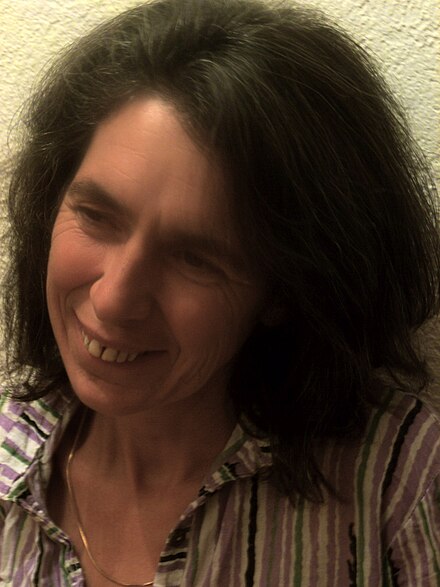Sadie Plant
Sadie Plant | |
|---|---|
 Plant in 2012 | |
| Born | Sarah Jane Plant 16 March 1964 Birmingham, England |
| Alma mater | University of Manchester |
| Occupation(s) | Philosopher, author, scholar |
| Known for |
|
| Website | www.sadieplant.com |
Sadie Plant (born Sarah Jane Plant;[1] 16 March 1964 in Birmingham, England[2]) is a British philosopher, cultural theorist, and author.[2]
Education
She earned her PhD in Philosophy from the University of Manchester in 1989 and subsequently taught at the University of Birmingham's Department of Cultural Studies (formerly the Centre for Contemporary Cultural Studies) before going on to found the Cybernetic Culture Research Unit with colleague Nick Land at the University of Warwick, where she was a faculty member.[3][4] Her original research was related to the Situationist International before turning to the social and political potential of cyber-technology. Her writing in the 1990s would prove influential in the development of cyberfeminism.[5]
Career
This section of a biography of a living person does not include any references or sources. (October 2022) |
Sadie Plant left the University of Warwick in 1997 to write full-time. She published a cultural history of drug use and control, and a report on the social effects of mobile phones, as well as articles in publications as varied as the Financial Times, Wired, Blueprint, and Dazed and Confused. She published the book Zeros + Ones in 1997, in which she reveals how women's role in programming has been overlooked. She was interviewed as one of the 'People to Watch' in the Winter 2000–2001 issue of Time.
Publications
- The Most Radical Gesture: The Situationist International in a Postmodern Age (1992, Routledge) ISBN 0-415-06222-5
- Zeroes + Ones : Digital Women and the New Technoculture (1997, Doubleday) ISBN 0-385-48260-4
- Writing on Drugs (1999, Faber and Faber) ISBN 0-571-19616-0
References
- ^ "Sadie Plant Contact". Sadie Plant. Retrieved 13 August 2018.
- ^ a b "Sadie Plant". British Council. 2011. Archived from the original on 24 February 2012. Retrieved 22 August 2012.
- ^ Mackay, Robin (27 February 2013). "Nick Land: an experiment in inhumanism". Umelec Magazine. Divus. Archived from the original on 18 January 2014.
- ^ Reynolds, Simon (1999). ""Renegade Academia" unpublished feature for Lingua Franca". Retrieved 27 December 2014.
- ^ Guertin, Carolyn (2003). Quantum feminist mnemotechnics: the archival text, electronic narrative and the limits of memory (PhD thesis). University of Alberta. OCLC 234362574. Archived from the original on 24 March 2016.
General references
- The Independent
- The Independent
- http://www.faber.co.uk/author/sadie-plant/
- http://www2.tate.org.uk/intermediaart/entry15419.shtm
- http://www.v2.nl/archive/people/sadie-plant
- https://web.archive.org/web/20120308043525/http://www.rigb.org/contentControl?action=displayContent&id=00000001211
- http://future-nonstop.org/c/bb37122bc11c3dd0787d5205d9debc41
- http://www.ephemerajournal.org/sites/default/files/3-1plantandland.pdf
External links
- A short biography of Sadie Plant
- Zero News Datapool: Sadie Plant – outdated site with several article links
- On the mobile: the effect of mobile telephones on social and individual life at the Wayback Machine (archived 25 June 2008) – essay by Sadie Plant commissioned by Motorola.
- On the mobile: the effect of mobile telephones on social and individual life at the Wayback Machine (archived 27 January 2007) – text-only version of above, formatted for US Letter paper.
- Sadie Plant, http://future-nonstop.org/c/cee09dd059c37acc692ef6ba19465afb talking in Vienna on systems, technology and gender], 1996
- Interview with Sadie Plant, Getting With The Program, Chicago Tribune, 3 November 1996